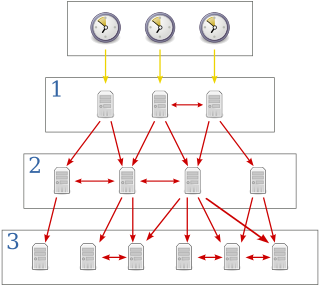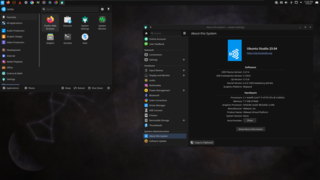
Cygwin is a Unix-like environment and command-line interface for Microsoft Windows.

Red Hat, Inc. is an American software company that provides open source software products to enterprises and is a subsidiary of IBM. Founded in 1993, Red Hat has its corporate headquarters in Raleigh, North Carolina, with other offices worldwide.
Samba is a free software re-implementation of the SMB networking protocol, and was originally developed by Andrew Tridgell. Samba provides file and print services for various Microsoft Windows clients and can integrate with a Microsoft Windows Server domain, either as a Domain Controller (DC) or as a domain member. As of version 4, it supports Active Directory and Microsoft Windows NT domains.

Security-Enhanced Linux (SELinux) is a Linux kernel security module that provides a mechanism for supporting access control security policies, including mandatory access controls (MAC).

The Network Time Protocol (NTP) is a networking protocol for clock synchronization between computer systems over packet-switched, variable-latency data networks. In operation since before 1985, NTP is one of the oldest Internet protocols in current use. NTP was designed by David L. Mills of the University of Delaware.
In computing, the superuser is a special user account used for system administration. Depending on the operating system (OS), the actual name of this account might be root, administrator, admin or supervisor. In some cases, the actual name of the account is not the determining factor; on Unix-like systems, for example, the user with a user identifier (UID) of zero is the superuser, regardless of the name of that account; and in systems which implement a role-based security model, any user with the role of superuser can carry out all actions of the superuser account. The principle of least privilege recommends that most users and applications run under an ordinary account to perform their work, as a superuser account is capable of making unrestricted, potentially adverse, system-wide changes.

sudo is a program for Unix-like computer operating systems that enables users to run programs with the security privileges of another user, by default the superuser. It originally stood for "superuser do", as that was all it did, and it is its most common usage; however, the official Sudo project page lists it as "su 'do' ". The current Linux manual pages for su define it as "substitute user", making the correct meaning of sudo "substitute user, do", because sudo can run a command as other users as well.
udev is a device manager for the Linux kernel. As the successor of devfsd and hotplug, udev primarily manages device nodes in the /dev directory. At the same time, udev also handles all user space events raised when hardware devices are added into the system or removed from it, including firmware loading as required by certain devices.
Technical variations of Linux distributions include support for different hardware devices and systems or software package configurations. Organizational differences may be motivated by historical reasons. Other criteria include security, including how quickly security upgrades are available; ease of package management; and number of packages available.

PulseAudio is a network-capable sound server program distributed via the freedesktop.org project. It runs mainly on Linux, including Windows Subsystem for Linux on Microsoft Windows and Termux on Android; various BSD distributions such as FreeBSD, OpenBSD, and macOS; as well as Illumos distributions and the Solaris operating system. It serves as a middleware in between applications and hardware and handles raw PCM audio streams.
HAL is a software subsystem for UNIX-like operating systems providing hardware abstraction.

Ubuntu Studio is a recognized flavor of the Ubuntu Linux distribution, which is geared to general multimedia production. The original version, based on Ubuntu 7.04, was released on 10 May 2007.
Opposition to software patents is widespread in the free software community. In response, various mechanisms have been tried to defuse the perceived problem.

Jami is a SIP-compatible distributed peer-to-peer softphone and SIP-based instant messenger for Linux, Microsoft Windows, macOS, iOS, and Android. Jami was developed and maintained by the Canadian company Savoir-faire Linux, and with the help of a global community of users and contributors, Jami positions itself as a potential free Skype replacement.

Linspire is a commercial operating system based on Debian and Ubuntu and currently owned by PC/OpenSystems LLC. It had been owned by Linspire. Inc. from 2001 to 2008, and then by Xandros from 2008 to 2017.
Docker is a set of platform as a service (PaaS) products that use OS-level virtualization to deliver software in packages called containers. The service has both free and premium tiers. The software that hosts the containers is called Docker Engine. It was first released in 2013 and is developed by Docker, Inc.

Snap is a software packaging and deployment system developed by Canonical for operating systems that use the Linux kernel and the systemd init system. The packages, called snaps, and the tool for using them, snapd, work across a range of Linux distributions and allow upstream software developers to distribute their applications directly to users. Snaps are self-contained applications running in a sandbox with mediated access to the host system. Snap was originally released for cloud applications but was later ported to also work for Internet of Things devices and desktop applications.
fwupd is an open-source daemon for managing the installation of firmware updates on Linux-based systems, developed by GNOME maintainer Richard Hughes. It is designed primarily for servicing the Unified Extensible Firmware Interface (UEFI) firmware on supported devices via EFI System Resource Table (ESRT) and UEFI Capsule, which is supported in Linux kernel 4.2 and later. Previously, the initiation of UEFI firmware updates within an operating system could, on most systems, only be performed using Microsoft Windows or DOS-specific software. ESRT allows the firmware to expose updatable components to the operating system, which can pass a UEFI capsule with updated firmware for processing and installation on the next boot. Updates can be exposed via a command line tool, or within graphical package managers via a D-Bus interface.
A domain controller (DC) is a server that responds to security authentication requests within a computer network domain. It is a network server that is responsible for allowing host access to domain resources. It authenticates users, stores user account information and enforces security policy for a domain. It is most commonly implemented in Microsoft Windows environments, where it is the centerpiece of the Windows Active Directory service. However, non-Windows domain controllers can be established via identity management software such as Samba and Red Hat FreeIPA.

The Software for Open Networking in the Cloud or alternatively abbreviated and stylized as SONiC, is a free and open source network operating system based on Linux. It was originally developed by Microsoft and the Open Compute Project. In 2022, Microsoft ceded oversight of the project to the Linux Foundation, who will continue to work with the Open Compute Project for continued ecosystem and developer growth. SONiC includes the networking software components necessary for a fully functional L3 device and was designed to meet the requirements of a cloud data center. It allows cloud operators to share the same software stack across hardware from different switch vendors and works on over 100 different platforms. There are multiple companies offering enterprise service and support for SONiC.










